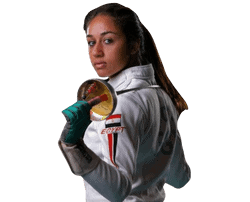Menu

asketball, uSA
Season 3
5
1
When Haydy Morsy won the 2019 Pentathlon African Championship, she became the first athlete worldwide to qualify for Tokyo. She now hopes to become the first Egyptian woman to compete in two different Olympic sports: she will be competing in modern pentathlon, and she’s additionally hoping to qualify in fencing.

In this episode, Haydy Morsy discusses trailblazing as a young woman athlete and aspiring sports journalist. We’ll begin by exploring how Haydy got into Modern pentathlon, learn about how her family has supported her, and then meet the mentor who helped pave the way for Haydy’s second career as a future sports journalist.
Experts interviewed include Ahmed Morsy (Haydy’s brother), Kata Stevens (Journalist and Audio Producer) Inas Mazhar (Deputy Editor-in-Chief and Head of Sports Section, Al Ahram Weelky Newspaper & Professor of Sports Media, American University in Cairo), Moamen Gouda (Associate Professor, Middle East Economics, Hankuk University of Foreign Studies; Associate Lecturer, Hamburg University in the program of Law and Economics in the Middle East), and Salma El-Naqqash (Feminist Researcher & Program Analyst, UN Women’s “Safe Cities and Safe Public Spaces for women and girls in Egypt”).
Audio from: UIPM Modern Pentathlon’s July 16, 2019 Facebook post, Olympic Channel’s “Sport guide: Modern Pentathlon Explained”, and TIME’s “The Uprising: Reflections on the Egyptian Revolution by Dominic Nahr.”
Taylor has been in the pool since age 4, when her mom (a swim coach) and older sister (also a swimmer) first introduced her to the water. A D1 recruit at Loyola University Maryland, Taylor was gearing up to make a splash at the collegiate level. She was then diagnosed with Ehlers-Danlos syndrome, a condition characterized by joint pain, loose joints, and hypermobility. According to Taylor, this period of her life was both physically and emotionally excruciating. She shares how she needed to “mourn the life [I] lost but also realize that [I] gained a new life.”
Hearing how important swimming was to her, Taylor’s physical therapist encouraged her to return to the water. One day when at the Loyola pool, the swim coach who recruited her suggested Taylor explore para swimming. This recommendation changed Taylor’s life.
Flash forward to today and Taylor is a 2x S10 American Record Holder and 7x Parapan Games medalist. As Taylor looks to the future, she hopes to see a world in which women are “valued like the men.” She also shares how she hopes to become a Mom and how “women can be strong and powerful” while also at the top of their sport.
Alejandra is the Dominican Republic’s first female Paralympic swimmer, a Parapan American silver medalist, engineer, dog mom, and as she shares, “a 4’3” tall girl promoting inclusion.”
When not swimming (which she does 4-5 hours a day), Alejandra works for the International Paralympic Committee, making sport more accessible for all. As if that’s not enough, she’s also writing her masters thesis. When asked how she juggles it all, she shares that she’s driven by her why. She knows exactly why she’s waking up so early and has crystal clear goals.
In today’s conversation, we talk about her hopes for Paris2024, and Ale shares big news — she’s preparing for her retirement post-Paralympics! She also debunks some of the misconceptions about the Paralympics:
1. Paralympians are elite athletes NOT recreational athletes
2. She’s competing in the Paralympics NOT Olympics (they are different!).
Manasi Joshi has won 10 gold, 9 silver and 15 bronze medals at level 1 international tournaments. She’s a former World Champion (SL3), an engineer, an Arjuna award winner, Aspen Fellow, and has spoken at Harvard.
As Manasi approaches the Paris Paralympics, she’s feeling “stronger than ever.” That said, she’s pauses to flag HOW she hopes journalists and the media should talk about her, or rather how they shouldn’t. She shares, “I don’t want to be called inspirational because I happen to play the sport with a disability. I want to be called inspirational because I put in the same amount of time and effort and show up every day.” Manasi shares that she’d rather have a short column than pages in a magazine focusing on how she’s an inspiration because of her disability.
She’s more than a headline that pulls at people’s heartstrings: she’s an elite athlete who dominates international tournaments and puts in the blood, sweat and tears to make it to the top.
Copyright @2024 Flamebearers Marketed and Designed by Bullzeye Media